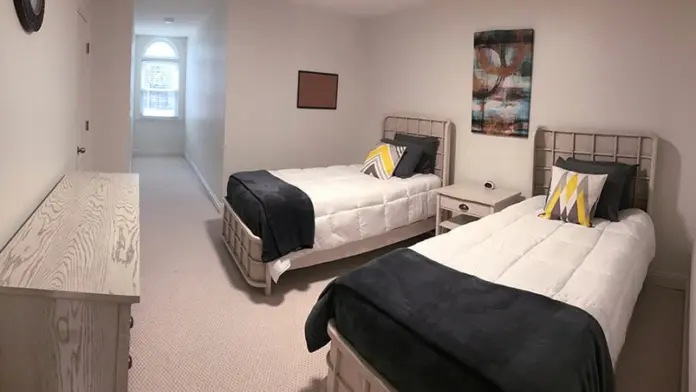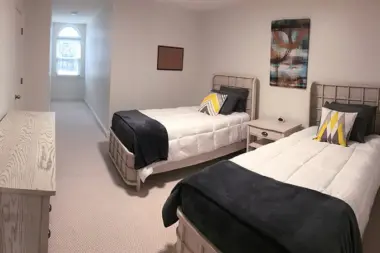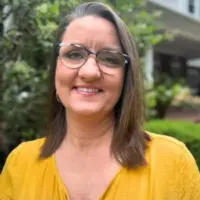About The Estate at River Bend – Addiction Treatment Center in Mississippi
The Estate at River Bend in Lucedale, Mississippi is a residential drug and alcohol treatment center set on 108 forested acres on the banks of the Pascagoula River. Joint Commission accredited, they offer 30 to 45 day inpatient treatment programs. They’re in network with most insurance providers and they were voted one of America’s Best Addiction Treatment Centers by Newsweek for 2024.
Evidence Based Treatment in a Natural Setting
Experienced in dual diagnosis treatment, they combine nature based experiential therapies with 12 step fundamentals. Their medical detox facility is open for admissions 24/7 and features amenities like private bedrooms and satellite television. Inpatient clients stay in cottage style living areas with community spaces for socializing and relaxation. They offer medication assisted treatment (MAT) alongside individual, group, and family therapies. Some of the modalities used are cognitive behavioral therapy (CBT), dialectical behavioral therapy (DBT), Acceptance and Integration therapy, motivational interviewing, and mindfulness.
Addiction Treatment for Veterans
Hero’s Path is their addiction program for veterans. Staff is specially trained to meet the unique needs of veterans and their families, and they coordinate care with VA caseworkers and medical experts. In addition to addiction counseling, they have groups on trauma and PTSD coping skills, reintegration into civilian life, and military sexual trauma. Adventure based counseling and somatic therapies are used in conjunction with modalities like CBT and DBT.
A Life Changing Place
Clients say this is a life changing place, and that you get what you put into the program. They call the staff compassionate and knowledgeable and say that it feels like a family. They describe the facility as beautiful, a place where individuals can truly rediscover themselves.
Latest Reviews
Rehab Score
Gallery








Accepted Insurance
Other Forms of Payment
Private insurance refers to any kind of healthcare coverage that isn't from the state or federal government. This includes individual and family plans offered by an employer or purchased from the Insurance Marketplace. Every plan will have different requirements and out of pocket costs so be sure to get the full details before you start treatment.
Self-pay involves paying for treatment out of your own pocket. You can use savings or credit, get a personal loan, or receive help from family and friends to fund your treatment. If you don't have insurance or your insurance plan doesn't cover a specific program, self-pay can help ensure you still get the care you need.
Addiction Treatments
Levels of Care
Clients stepping down from inpatient care or who prefer to remain at home while receiving intensive treatment may choose to enroll in an outpatient rehab. Outpatient day treatment, partial hospitalization (PHP), and intensive outpatient programs (IOP) are designed for clients requiring more robust supervision and daily treatment. Standard outpatient services enable clients to attend addiction counseling and recovery education throughout the week, with many centers offering weekend, night, and evening sessions to accommodate clients' work and family schedules.
Residential treatment programs are those that offer housing and meals in addition to substance abuse treatment. Rehab facilities that offer residential treatment allow patients to focus solely on recovery, in an environment totally separate from their lives. Some rehab centers specialize in short-term residential treatment (a few days to a week or two), while others solely provide treatment on a long-term basis (several weeks to months). Some offer both, and tailor treatment to the patient's individual requirements.
Clients in an intensive outpatient program (IOP) require substantive support as they prepare to transition into standard outpatient (OP) care or community-based recovery programs, such as AA. Most IOP clients are in early recovery or are at an elevated relapse risk. Intensive outpatient treatment generally involves multiple, extended sessions weekly. Many programs require clients to participate in a minimum of nine therapeutic hours weekly. The most common treatment modalities include psychotherapy, recovery education, and medication assisted treatment.
Participants in 12 step programs focus on the development of spiritual, psychological, and emotional skills to support sustained recovery. They regularly attend 12 step meetings, which are free, peer-directed, anonymous, open to the public, and accessible daily in most communities. Specialized formats are also widely available, including groups for seniors, teens, and families. Though these programs are rooted in the belief in a higher power, religious affiliation is not required.
Under the 24/7 care of medical professionals, a medically supervised detox helps to ensure your maximum safety and comfort while ridding the body of all addictive substances. In many cases, your medical team will administer various medications (like Suboxone or methadone) to help alleviate the symptoms of withdrawal. After you are fully detoxed off drugs and alcohol, you'll likely transition to the next stage of your recovery process.
Treatments
Substance rehabs focus on helping individuals recover from substance abuse, including alcohol and drug addiction (both illegal and prescription drugs). They often include the opportunity to engage in both individual as well as group therapy.
Clinical Services
Evidence based therapies offered in group therapy settings in Mississippi ensure that you are accountable to your peers. This encourages everyone to stay committed to their recovery and fosters a sense of community with other participants. You learn essential coping skills that help you navigate challenges within the community and achieve sustainable recovery.
Individual therapy for drug addiction provides you a safe nonjudgmental space to discuss your struggles and past trauma that impact addictive behavior. Your therapist offers support and guidance as you develop personalized strategies to navigate the challenges of recovery.
The goal of trauma therapy is to help you heal from the effects of witnessing or experiencing a traumatic event. You are provided support to process those traumatic memories and then develop coping strategies to improve your emotional resilience and ability to cope in society.
While undergoing couples therapy, you'll explore any problems in your relationship with the goal of identifying and resolving dysfunctional patterns. You'll learn new and better ways to manage challenges so you can move forward with a healthier relationship.
Family therapy involves group sessions in which all members of the family unit are together to discuss how addiction has affected them collectively and individually. Experienced therapists help guide families to develop strategies that protect their well being and emotional health while supporting their loved one's efforts to recover.
Amenities
-
Residential Setting
-
Private Rooms
Staff & Accreditations
Staff

Billy Vevle, LCSW
Chief Executive Officer

Idice Darden, CADC, CPSS
Director of Admissions

Vicky Lowery
Director of Human Resources

Kerry Kokaisel, DNP, PMHNP-BC
Director of Nursing

Donald Faucett, DR
Medical Director
Accreditations

LegitScript has reviewed The Estate at River Bend – Addiction Treatment Center in Mississippi as part of their certification program, and has determined that it meets the LegitScript standards for legality, safety and transparency.
LegitScript verified in

State Licenses are permits issued by government agencies that allow rehab organizations to conduct business legally within a certain geographical area. Typically, the kind of program a rehab facility offers, along with its physical location, determines which licenses are required to operate legally.
State License: Mississippi

The Joint Commission, formerly known as JCAHO, is a nonprofit organization that accredits rehab organizations and programs. Founded in 1951, the Joint Commision's mission is to improve the quality of patient care and demonstrating the quality of patient care.
Joint Commission Accreditation: Yes
Contact Information
226 Lowe Lane
Lucedale, MS 39452

